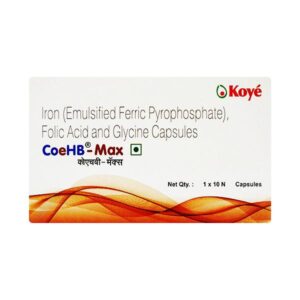IRON + FOLICACID
Iron: Iron is a mineral that is essential for the production of hemoglobin, a protein in red blood cells responsible for carrying oxygen throughout the body. Iron supplements are commonly used to treat iron deficiency anemia, a condition characterized by low levels of red blood cells due to insufficient iron.
The mechanism of action of iron involves its incorporation into the structure of hemoglobin, which allows red blood cells to transport oxygen effectively. Iron is also involved in several enzymatic reactions that play a crucial role in energy production and DNA synthesis.
The dose of iron supplements varies depending on the severity of the deficiency and the prescribing physician’s recommendation. Commonly, the recommended daily dose for adults is around 60-120 mg of elemental iron, which is divided into several doses throughout the day to enhance absorption. It is worth noting that iron supplements should be taken with caution, as excessive iron intake can be toxic to the body.
While iron supplementation is generally safe when taken as directed, it can have some side effects. The most common side effects include constipation, nausea, diarrhea, stomach pain, and heartburn. These gastrointestinal side effects can often be reduced by taking the iron supplement with food or by starting with a lower dose and gradually increasing it. Iron supplements may also cause the stools to appear darker in color, which is a harmless effect.
In rare cases, iron supplements can cause more severe side effects, such as allergic reactions, including rash, itching, and swelling. Overdosing on iron can lead to iron toxicity, which can cause symptoms such as abdominal pain, vomiting, organ damage, and in severe cases, even death. Therefore, it is important to follow the recommended dosage and consult a healthcare professional before starting iron supplementation.
It is worth mentioning that iron supplements should not be taken without a proper diagnosis of iron deficiency anemia. A blood test is usually conducted to determine the iron levels in the body before starting iron supplementation. If the underlying cause of anemia is not related to iron deficiency, taking iron supplements may not be effective and could potentially worsen the condition.
Folicacid: Folic acid, also known as vitamin B9, is a synthetic form of folate, a water-soluble vitamin. It is used to treat or prevent folate deficiency in the body. Folate is important for the production and maintenance of new cells in the body, including red blood cells. Folic acid is often prescribed to pregnant women to prevent neural tube defects in their babies.
The mechanism of action of folic acid involves its conversion to its active form, tetrahydrofolic acid, in the body. Tetrahydrofolic acid is essential for the synthesis of DNA and RNA, as well as for amino acid metabolism and cell division.
The dose of folic acid varies depending on the condition being treated. For folate deficiency, the usual adult dose is 0.4-0.8 mg per day. During pregnancy, the recommended dose is typically higher, around 0.6-1 mg per day. The dosage should be determined by a healthcare professional based on individual needs.
Overall, folic acid is considered safe and well-tolerated. However, some common side effects may include nausea, diarrhea, loss of appetite, and allergic reactions. High doses of folic acid can mask a type of anemia called pernicious anemia, so it is important to monitor blood cell counts regularly while taking this medication. Folic acid may also interact with certain medications, such as antiepileptic drugs, and reduce their effectiveness.
It’s important to note that while folic acid is generally safe, it should be taken only under the guidance of a healthcare professional. Self-diagnosis and self-treatment with folic acid may not be appropriate for certain conditions.

